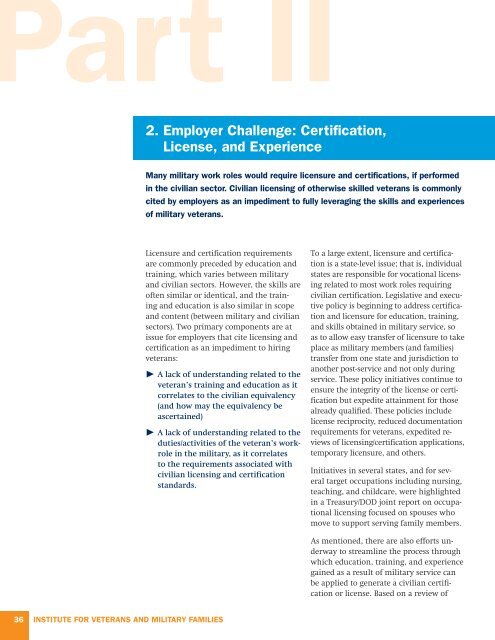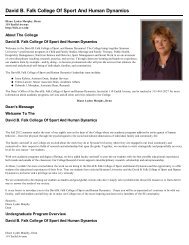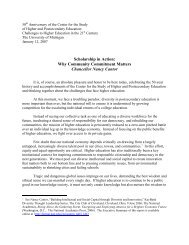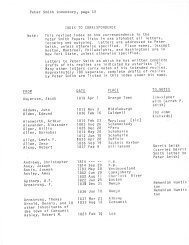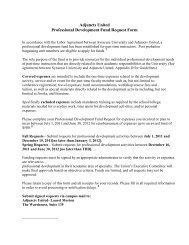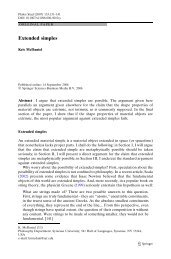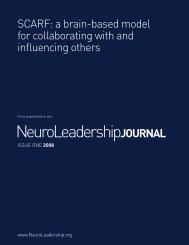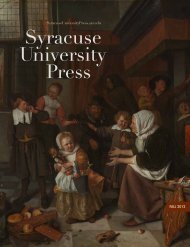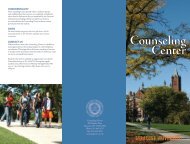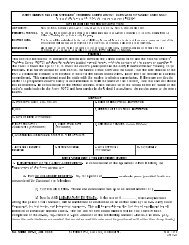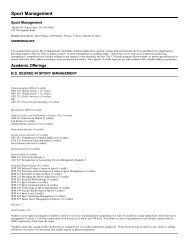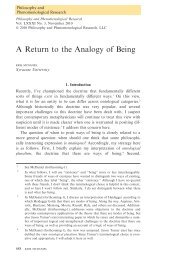art II2. Employer Challenge: Certification,License, and ExperienceMany military work roles would require licensure and certifications, if performedin the civilian sector. Civilian licensing of otherwise skilled veterans is commonlycited by employers as an impediment to fully leveraging the skills and experiencesof military veterans.Licensure and certification requirementsare commonly preceded by education andtraining, which varies between militaryand civilian sectors. However, the skills areoften similar or identical, and the trainingand education is also similar in scopeand content (between military and civiliansectors). Two primary components are atissue for employers that cite licensing andcertification as an impediment to hiringveterans:▶ A lack of understanding related to theveteran’s training and education as itcorrelates to the civilian equivalency(and how may the equivalency beascertained)▶ A lack of understanding related to theduties/activities of the veteran’s workrolein the military, as it correlatesto the requirements associated withcivilian licensing and certificationstandards.To a large extent, licensure and certificationis a state-level issue; that is, individualstates are responsible for vocational licensingrelated to most work roles requiringcivilian certification. Legislative and executivepolicy is beginning to address certificationand licensure for education, training,and skills obtained in military service, soas to allow easy transfer of licensure to takeplace as military members (and families)transfer from one state and jurisdiction toanother post-service and not only duringservice. These policy initiatives continue toensure the integrity of the license or certificationbut expedite attainment for thosealready qualified. These policies includelicense reciprocity, reduced documentationrequirements for veterans, expedited reviewsof licensing/certification applications,temporary licensure, and others.Initiatives in several states, and for severaltarget occupations including nursing,teaching, and childcare, were highlightedin a Treasury/DOD joint report on occupationallicensing focused on spouses whomove to support serving family members.As mentioned, there are also efforts underwayto streamline the process throughwhich education, training, and experiencegained as a result of military service canbe applied to generate a civilian certificationor license. Based on a review of36 INSTITUtE FOR veterans and military families
those efforts, New York State has madethe most significant progress in this area.For example, in New York, a commercialdriver’s licensure (CDL) has been streamlinedfor veterans who held similar rolesin the military, as have some positions inhealthcare and education. Efforts are alsocurrently underway in New York to reducethe training and experience required ofmany private security and law enforcementcertifications, for those individualswho performed similar work roles whileserving in the military. Other states havetaken steps similar to New York for emergencymedical technician and ambulancedriver roles, and there is an ongoing efforton the federal level for those occupationsthat require federal licensure.All that said, from an employer perspectivethe general consensus is that stateregulatory agencies have been slow toaddress this important issue, and ongoinginitiatives are disparate and uncoordinated.While some states have taken significantand meaningful steps to acknowledgemilitary training and experience in theirlicensing and certification programs (e.g.,New York, Pennsylvania, Washington),others have taken limited or no action. Asit is in the best interest of both the veteranand the employer that military trainingand experience can be leveraged in theform of a civilian license or certification,some firms have taken proactive steps toovercome the challenges related to certification,and by doing so have been able toleverage the skills, training and experienceof veterans in the workforce. Detailed beloware some of the strategies adopted byleading employers to address the challengesrelated to certification and licensure ofmilitary veterans.Recommendations & Resources:The following recommendations are providedfor employers related to licensingand certification:▶ Identify those work roles withinyour organization that require state/federal licensure or certification, andconcurrently identify those militaryoccupations that assume similarskills, training, and experience. Manyof the available Military OccupationalSpecialty (MOS) translator tools canassist with mapping civilian workroles to military occupations. 2▶ Assign the firm’s human resourcesteam to stay up-to-date and informedas to state-specific policies, programs,and initiatives focused on licensingand certification programs impactingveterans–particularly as those initiativesrelate to work-roles in demandat your organization.▶ Firms with operating locations acrossmultiple states may be positionedto leverage state-specific reciprocityagreements with regard to the licensing/certificationopportunities forprospective veteran employees, wherea given state has taken steps to providelicensing/certification opportunitiesto veterans (given military education/training/experience).guide to leading policies, practices & resources 37
- Page 1 and 2: GUIDE TO LEADING Policies, PRACTICE
- Page 3 and 4: GUIDE TO LEADINGPOLICIES, PRACTICES
- Page 5 and 6: AcknowledgementsFirst and foremost,
- Page 7 and 8: Part IV 1001In Support of the Emplo
- Page 10: art IWhat This Guide DoesThe “Gui
- Page 15 and 16: Setting the ContextThis section is
- Page 17 and 18: to work and to be economically enga
- Page 19 and 20: c.Projected Job CreationImpacting V
- Page 21 and 22: ▶Health and Wellness Implications
- Page 23 and 24: ment directly, e.g., the Veterans
- Page 25 and 26: credit, the veteran may transition
- Page 27 and 28: Ultimately, employment is a key to
- Page 29 and 30: “Veterans are exceptionalindividu
- Page 31 and 32: ue patterns of education and traini
- Page 33 and 34: well, requiring affirmative steps t
- Page 35 and 36: during a single 12-month period to
- Page 37 and 38: guide to leading policies, practice
- Page 39 and 40: In Part II of this publication we h
- Page 41 and 42: Research studies focused on both mi
- Page 43: ▶Veterans Have Experience/Skillin
- Page 47 and 48: 3. Employer Challenge: Skills Trans
- Page 49 and 50: Recommendations & Resources:▶ MOS
- Page 51 and 52: ▶ Executive-level engagement prom
- Page 53 and 54: 5. Employer Challenge: TrackingVete
- Page 55 and 56: Strategies for Tracking Veterans in
- Page 57 and 58: To create a veteran-engaged culture
- Page 59 and 60: tion, as well as encouragement and
- Page 61 and 62: ▶ When the veteran is hired, make
- Page 63 and 64: In response to calls from employers
- Page 65 and 66: in the firm, and is physically assi
- Page 67 and 68: personnel to become better educated
- Page 69 and 70: .Additional Leading PracticeExample
- Page 71 and 72: ing, and career coaching and mentor
- Page 73 and 74: In the context of this research and
- Page 75 and 76: 2. Leading Practices: Training andP
- Page 77 and 78: VETalent is expanding, and Prudenti
- Page 79 and 80: utilize these shadowing opportuniti
- Page 81 and 82: C. Summarysuch programs to include
- Page 83 and 84: ▶ A Transfer Guide: Understanding
- Page 85 and 86: Leading Practices Models:WalmartSca
- Page 87: An internal network of military vet
- Page 91 and 92: support for injured veterans, manag
- Page 93 and 94: is to serve as a company resource o
- Page 95 and 96:
surviving parents, spouses, childre
- Page 97 and 98:
Challenges to Implementation andSca
- Page 99 and 100:
.▶ Furthermore, Walmart believest
- Page 101 and 102:
▶ American Corporate Partners (AC
- Page 103 and 104:
5. Teaming and Developing Small Bus
- Page 105 and 106:
▶ JPMC’s Supplier Diversity Net
- Page 107 and 108:
▶ Expand the presence of diverses
- Page 109 and 110:
1. In Support of the Employer: Issu
- Page 111 and 112:
TABLE 1:Summary of BLS Employment S
- Page 113 and 114:
figure 1:Unemployment Rates by Vete
- Page 115 and 116:
table 3:Unemployment Rate of Vetera
- Page 117 and 118:
figure 2: Number of Unemployed Vete
- Page 119 and 120:
UNEMPLOYME40%30%UNEMPLOFIGURE Afric
- Page 121 and 122:
elationships with family, and 44% f
- Page 123 and 124:
0%0%0%0%0%0%0%0%0%0%0%0%figure 6:So
- Page 126 and 127:
art IVAccess to HealthcareAccess to
- Page 128 and 129:
art IVResearchers have found that e
- Page 130 and 131:
art IV▶ ADA Disability and Busine
- Page 132 and 133:
art IVstudy that examined the preva
- Page 134 and 135:
art IV▶ Vision ImpairmentsThe Nat
- Page 136 and 137:
ummaryFor the better part of the pa
- Page 138 and 139:
AppendicesThe following resources,
- Page 140 and 141:
AppendicesAppendix B:Checklist for
- Page 142 and 143:
AppendicesAppendix D:Checklist for
- Page 144 and 145:
Appendices▶ The Veterans Opportun
- Page 146 and 147:
AppendicesPrivate Sector Initiative
- Page 148 and 149:
Appendices▶ Ryder System Inc., a
- Page 150 and 151:
AppendicesAppendix G:Summary of Sta
- Page 152 and 153:
Appendices144 INSTITUtE FOR veteran
- Page 154 and 155:
Appendicesof the education and expe
- Page 156 and 157:
CitationsPART I1Krier, D., Stockner
- Page 158 and 159:
Citations22Rodriguez, E., Lasch, K.
- Page 160 and 161:
Citations7Disability Case Study Res
- Page 162 and 163:
Citations14Student Veterans of Amer
- Page 164 and 165:
Citations43CSX Corporation Inc. (20
- Page 166 and 167:
Citations74Merrill Lynch (2008). Su
- Page 168 and 169:
Citations11Hall, R.E. (1972). Turno
- Page 170 and 171:
Citations38Kulka, R.A., Schlenger,
- Page 172:
700 University Avenue, Suite 303Syr


